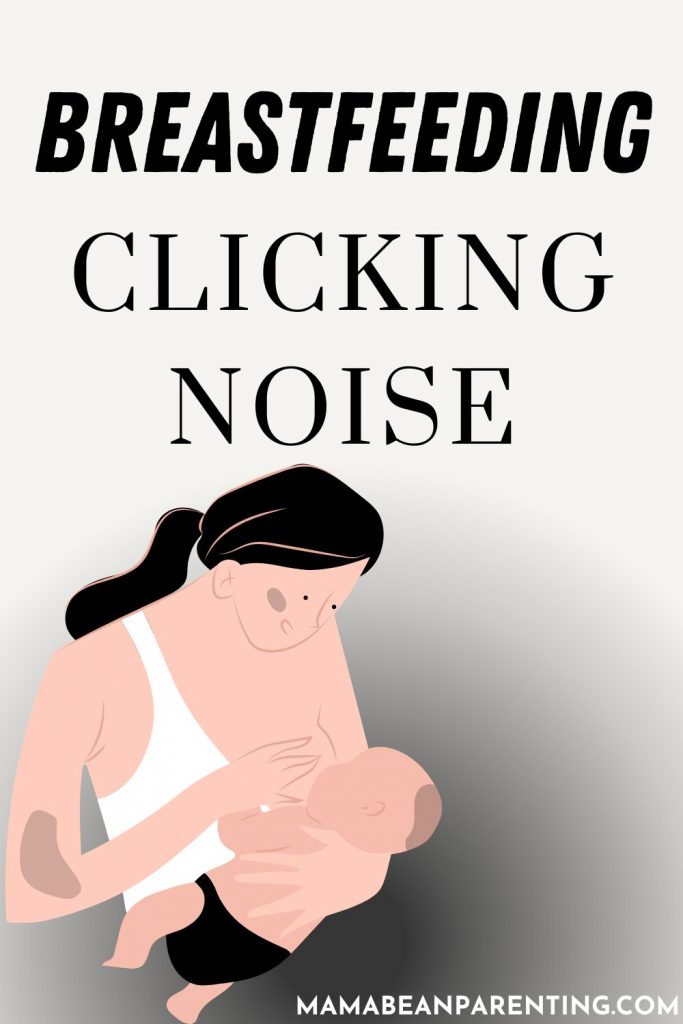Breastfeeding clicking noise can sound disturbing, especially if this is your first child.
Breastfeeding is quite challenging and there are many things that can be confusing. For this reason, it’s important to educate yourself. Everything that seems weird to you should be explored further.
Don’t be afraid or ashamed to ask questions.
Use your free time to learn more about nursing. Some things can seem weird, but they are normal. Other things can be a reason to worry. You never know what can happen, and if you don’t know everything about breastfeeding, you should do your research.
Breastfeeding clicking noise can be normal, but it can also be something to pay attention to. If the baby is making sounds like clicking while breastfeeding, you should be more noticeable of that.
Breastfeeding Clicking Noise

Breastfeeding clicking noise is quite self-explanatory. It means that your baby is making clicking sounds while breastfeeding. For some moms, this is normal; for others, it seems scary.
Breastfeeding clicking noise can mean a few things and this article will help you to learn more about it.
This clicking sound happens because the baby is breaking the seal or suction. It usually happens only at the beginning of the breastfeeding session.
If you hear it all the time while you’re nursing, it means that the baby is repeatedly breaking the seal.
This can be harmless, but it can also be a sign of concern. If this breastfeeding clicking noise is causing you pain or discomfort, you have to solve this issue.
Swollen Or Engorged Breasts
There are many reasons for breast swelling or engorgement. Maybe you have too much milk inside your breasts. This can happen if you’re trying to stop pumping at night.
Maybe your milk ducts are clogged. It’s even possible to have mastitis. Sometimes there is no reason behind engorged breasts. They’re usually less swollen after a breastfeeding session.
When the breast is swollen, your baby will have a hard time latching. This can cause constant breastfeeding clicking noise because the baby is starting to nurse over and over.
You can try extracting some of your milk manually or with a breast pump. This could reduce engorgement and swelling. Warm compresses and warm showers could also help. When you drain some of your breast milk, your baby should latch on easier.
Wrong Breastfeeding Position
Many moms think that the breastfeeding position doesn’t matter. Some babies will indeed nurse in any position, but others need some adjustment.
If you don’t position your baby right, it’s possible to experience painful breastfeeding even with a good latch.
The breastfeeding clicking sound doesn’t have to be painful, but it could be an indicator of a bad breastfeeding position.
There are a few breastfeeding positions, but the important thing is that your baby’s mouth is covering your nipple. The baby’s mouth should be wide open and the chin should be touching or barely touching your breast. The lower lip should be turned out.
The baby’s head and body should be in line, so no twisting baby’s head. If you see your baby swallowing, that means that it’s breastfeeding successfully.
After the breastfeeding session, your breast should feel softer and lighter. This is also a sign of successful feeding.
If you hear a breastfeeding clicking noise always, it could mean that the baby is not in the right position to latch on properly. Try to follow these tips, and adjust your baby’s head and body to achieve a better position.
In rare cases, it’s possible that the baby has a tongue tie, so it’s very hard to find a good breastfeeding position to latch on.
Too Much Breast Milk

When you have a lot of breast milk, it will come out very fast. Sometimes the breast milk comes out too fast, and the baby can’t keep up with the fast milk flow.
When that’s the case, the baby has to take breaks, and that’s why you constantly hear clicking while breastfeeding. You will also notice that the milk is spilling around the baby’s mouth and your breast.
To solve this problem, I suggest extracting or pumping some of your milk. When you drain some of it, the rest of the milk will come out slower.
Too Little Breast Milk
If your breast milk supply is low, the baby may constantly break suction to get more milk.
If this is the case, I suggest finding a way to increase your milk supply. Lactation drinks could be very helpful. Taking care of your diet and hydration is also essential in these cases.
Painful Teething
The teething period is hard for parents and babies too. It’s not uncommon that a teething baby won’t sleep easily.
Sometimes even breastfeeding can be uncomfortable. The baby feels pain and discomfort in the mouth.
It becomes hard to keep the suction for a long time. So, the baby has to take breaks. This is also one of the reasons for breastfeeding clicking noise.
Your baby simply needs a break because the gums are inflamed and swollen as a result of teething.
Certain Illness
A sick baby is often fussy and everything becomes harder. Certain medical conditions or diseases can cause your baby to break the suction and start over again repeatedly.
For example, an ear infection can disturb the baby’s suction. The baby feels pressure from an ear infection, and pain is usually present.
It becomes uncomfortable to keep the suction for a long time, and that’s why you hear clicking while breastfeeding.
Sometimes the thrush can cause a painful mouth and gums which can also be the reason for problems with suction.
If your baby has thrush it’s important to see a doctor and find the cause. It’s also important to check if you have a breast thrush.
Sometimes s simple cold or flu can be a reason for breastfeeding clicking noise. When the baby’s nose is congested, it’s hard to breathe, so the baby has to take frequent breaks while breastfeeding.
Other conditions that don’t affect the baby’s nose and mouth can also cause clicking while breastfeeding. Your baby can be distracted by certain pain or discomfort.
Problems With Oral Anatomy
Sometimes babies with tongue tie or other anatomical problems in their mouth have problems with keeping the suction.
There are even special pacifiers for babies with tongue tie.
This is also the reason for breastfeeding clicking noise. In most cases, the doctors will notice if something is wrong with the baby’s tongue, palate, or mouth in general.
Most of these anatomical problems are easy to solve, and there is no need for worry.
If the doctor didn’t notice certain problems and you have a reason to believe that there is something wrong, you should see a specialist as soon as possible.
Asking For Help

Most of these problems that can cause breastfeeding clicking noise are easy to solve, and they don’t cause any serious problems.
However, if your breastfeeding sessions are painful, and if your baby is not gaining weight, you have to see a professional. Sometimes it’s hard to find the solution if we’re worried and overwhelmed.
Finding a good lactation consultant is your solution. When you have a problem with positioning the baby or milk supply, you need professional help.
It’s important to find someone who will truly pay attention to you and your case. You need a person who will understand you and be patient with you.
A lactation consultant is important, but a doctor should be involved too. When your baby is losing weight, or when you think that something is wrong, you have to ask for medical help.
In some cases, the doctor will find out the underlying reason for clicking sound while breastfeeding, for example, tongue tie or ear infection.
In other cases, you will simply get a confirmation to work harder on breastfeeding positions and milk supply.
As I’ve mentioned, sometimes a medical condition could be the cause of this clicking sound. Don’t take this lightly.
There are situations when everything is fine. There is no medical condition, and your positioning and milk supply is great. Your baby has no problems with anything, but the clicking sound is happening anyway.
If your baby is healthy and growing and you notice weight gain, don’t worry. If you don’t have a problem when nursing, just keep going.
Some babies are simply different, and there is no need to worry as long as you check everything.
Think About Your Options
If the reason for clicking sounds while breastfeeding is something that should be treated with medications or therapy, don’t hesitate and listen to your doctor.
Tongue-tied babies are not rare at all, but this problem is very easy to solve. Most doctors can remove the tongue tie in a few minutes.
If there is a problem with your milk supply or baby’s positioning that causes clicking sounds, you have to think about other options.
If your baby is hungry, think about incorporating baby formula. Think about pumping to increase your milk supply and using a bottle to feed your baby.
This is usually hard for moms who have already tried breastfeeding, but you have to think about your baby’s needs.
If the problem is the baby’s position, consider buying a good breastfeeding pillow. You have to be ready to solve these issues, even when they don’t seem so serious.
It would be great to continue breastfeeding, but if something else is better for your little one, you have to go in that direction.
Conclusion

When your baby makes clicking noises, it can be a reason for you to become worried. After all, there are many reasons for clicking baby sounds while breastfeeding. Now that you know those reasons, focus on finding the one that suits your clicking baby.
Breastfeeding a newborn baby is quite stressful and it can affect your mental health. You simply know that you’re responsible for that being. You know that everything is in your hands.
When something seems off, it’s normal to feel anxious and nervous. You’re a mom now, and you will feel like that in many life situations.
Try to stay calm and always look for answers. Be there to help your little one, and stay strong in every situation. Breastfeeding clicking noise can be funny to some people, but when you’re a mom, you analyze everything.
Hi all, I am Sidney, an accountant, a hobbyist photographer, and a mother to two sweet girls who are my motivation. I love sharing the tips and tricks I gained all these years I’ve been a mother. I hope it will help you!


